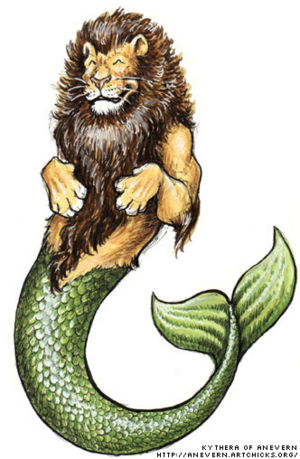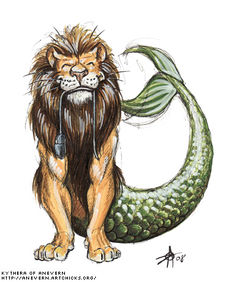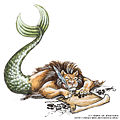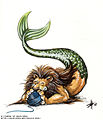Mirthlion: Difference between revisions
m (Categorized) |
No edit summary |
||
| Line 10: | Line 10: | ||
===Taxonomy and evolution=== | ===Taxonomy and evolution=== | ||
[[Image:Webwright.jpg|thumb|upright|left|The first recorded depiction of a mirthlion. This one appears to be a webwright.]]Though the time of their precise origin is in some doubt (estimates are [[Lyondemere: In the Beginning|approximately 1975]] by common reckoning), the first recorded sighting was in A.S. 42 by [[Cithrúadh dubán]]. | [[Image:Webwright.jpg|thumb|upright|left|The first recorded depiction of a mirthlion. This one appears to be a webwright.]]Though the time of their precise origin is in some doubt (estimates are [[Lyondemere: In the Beginning|approximately 1975]] by common reckoning), the first recorded sighting was in A.S. 42 by [[Cithrúadh dubán|Ciothruadh of Lyondemere]]. | ||
===Physical characteristics=== | ===Physical characteristics=== | ||
Revision as of 21:43, 3 January 2010
Mirthlions (Panthera leo jovialis) are commonly found in the Barony of Lyondemere. Despite their leonine appearance, they are generally friendly and quick to welcome visitors to their territory with open arms and joyful hospitality.
Etymology
The term "mirthlion" is thought to be a derivation of "mer-lion", as the two creatures are very closely related. Unlike the common mer-lion, an example of which can be found on the baronial device of Lyondemere, the mirthlion is rarely observed to be aggressive or frumpy. Rather, they are most often observed to be in a perpetual state of happiness or "mirth".
Biology and behavior
Mirthlions are generally extremely social creatures. They enjoy the company of just about any other living creature, provided that there is a sufficient absence of drama. They can be somewhat territorial and are rumored to be exceptionally dangerous when provoked, but they are also said to be inhumanly difficult to so provoke, and no incidents are on record. Regardless, mirthlions are very welcoming creatures, prone to generous displays of hospitality. They love to party, and are extremely fond of pancakes.
Taxonomy and evolution
Though the time of their precise origin is in some doubt (estimates are approximately 1975 by common reckoning), the first recorded sighting was in A.S. 42 by Ciothruadh of Lyondemere.
Physical characteristics
Despite the presence of scales and fins, the mirthlion is generally classified as a mammal, due to their ability to breathe air exclusively (mirthlions do not have gills, so they probably cannot breathe under water) and their capacity to bear live young. Unlike their cousin, the common lion, the paws of a mirthlion are unusually nimble and dexterous, allowing them to manipulate tools such as needles and pliers with surprising skill. It is uncertain whether quills and ink give them particular difficulty, or if distributing ink pawprints is deliberately intended to cause frustration among the human scribes they sometimes associate with.
Distribution and habitat
The mirthlion is commonly found in and around the Barony of Lyondemere, though they can range throughout the surrounding baronies and occasionally migrate far and wide throughout the Known World in search of adventure. Their natural habitats include warm beaches, ocean side cliffs, underwater caves, yarn shops, and fabric stores.
Cultural depictions
The Mirthlions of Lyondemere are a (more or less) regular feature in the Tydes, though they are known to make appearances in various other places, and can ocasionally be seen adorning satchels and clothing of the populace of Lyondemere.
Gallery







